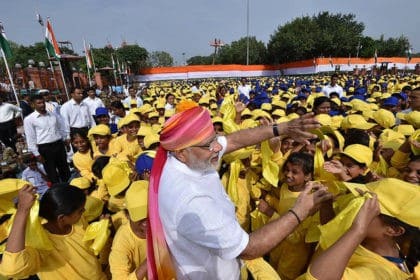Discussion on India’s upcoming State and General Elections
With the Modi government’s five-year term drawing to a close in May next year and a series of important State elections later this year, UK businesses are asking what the upcoming General Election will mean for them. This note summarises the first in a series of discussions the UKIBC is holding with members and political experts to discuss the likely outcomes.

Ahead of the elections, the 24 September General Election roundtable first considered the impact of Modi’s record in power. The important themes that came to the fore were: tackling corruption; improving the ease of doing business; and building inclusive growth.
What is Modi’s record in power?
Members welcomed the GST making the tax process comparatively efficient and saving significant logistical costs, but were concerned that further steps should be taken to simplify GST. Part of a wider digitalisation drive, the Direct Benefit Transfer scheme and the delivery of Aadhaar (the world’s largest biometric ID system) have made significant strides to ease personal and business transactions with government. Though demonetisation may not have achieved its original objective of stamping out on black money, it has provided a clear signal to ordinary Indian’s on Modi’s willingness to take strong action on corruption.
New creditor-focussed insolvency laws and strides to regulate the complicated real-estate market have likewise proved welcome efforts to ease the ability to do business. These efforts have been complimented by an inclusive growth strategy that, whilst not meeting all targets, has made impressive achievements in building highways, metro systems, renewable energy development and delivering an electricity connection to every village in India.
Members noted that Modi’s record of large-scale structural reform are not without risk however. In the international context of growing US protectionism, there is concern the dollar strength could weaken the rupee, putting pressure on the current account deficit and leading to slightly higher inflation. Likewise, members felt that public sector banks could do more to support smaller businesses and start-ups.
That said, India’s fundamentals remain stable and promising. The country holds adequate foreign exchange reserves to meet short-term challenges, the Modi-Trump relationship is good and, of course, India has a fast growing and aspirational middle-class.
On the path to the General Election
The outcomes of the upcoming State elections may also offer members a window on how Modi’s record will impact the general election. Though Modi’s BJP holds three of the States due to vote there is potential for the anti-incumbency effect to work against the BJP in Rajasthan, Chhattisgarh and Madhya Pradesh.
States such as Telangana where the BJP have not historically been in contention however may conversely offer the BJP a platform to mobilise growing anti-incumbency.
But what about the General Election?
Based on Modi’s record in power and the key State elections, there appear to be three possible outcomes to the General Election.
At one end, Modi’s BJP could win another outright majority in the election meaning reduced legislative hurdles to Modi carrying out major reforms. Conversely the BJP could fall short of a majority in the region of 100 seats in which case the BJP will likely remain the single largest party forming the government but with questions raised over Modi’s leadership.
Between these outcomes it is likely the BJP could emerge as the largest party, but with 30-40 seats short of a majority. Should this come to fruition it is likely that Modi, with the support of allied parties, will remain a strong Prime Minister though without a straight forward legislative path through Parliament.
At this stage it appears likely Modi’s reputation for action and bold structural change will take the BJP, at the head of a NDA coalition, over the line, giving stability and space to potentially further simplify the GST, push exports, and start addressing issues in the public sector banks.
The UKIBC looks forward to delivering further roundtables on this subject, and to hearing insights from our members and other experts as the elections draw closer. For more information on our upcoming events please email us.



